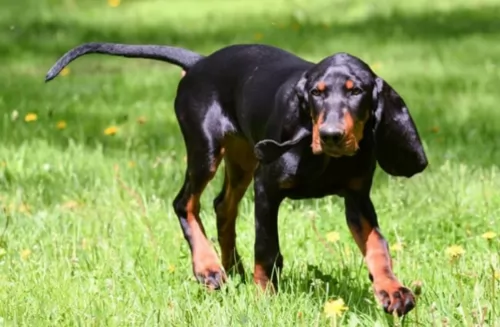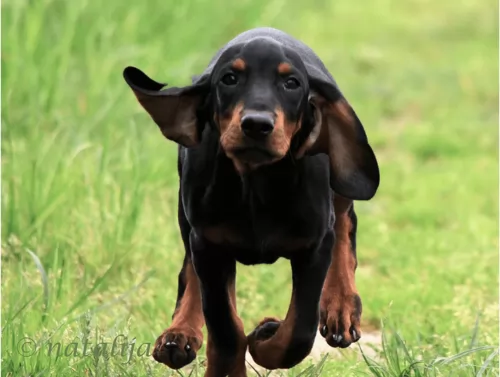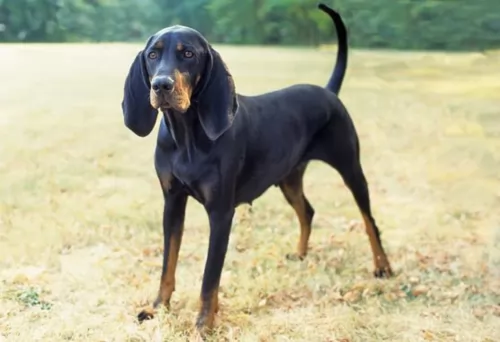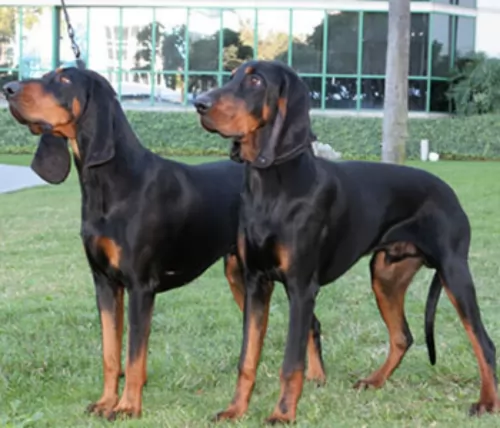 Petzlover
Petzlover Black and Tan Coonhound is originated from United States but Tea Cup Chihuahua is originated from Mexico. Black and Tan Coonhound may grow 31 cm / 13 inches higher than Tea Cup Chihuahua. Black and Tan Coonhound may weigh 31 kg / 69 pounds more than Tea Cup Chihuahua. Both Black and Tan Coonhound and Tea Cup Chihuahua has almost same life span. Black and Tan Coonhound may have more litter size than Tea Cup Chihuahua. Both Black and Tan Coonhound and Tea Cup Chihuahua requires Moderate Maintenance.
Black and Tan Coonhound is originated from United States but Tea Cup Chihuahua is originated from Mexico. Black and Tan Coonhound may grow 31 cm / 13 inches higher than Tea Cup Chihuahua. Black and Tan Coonhound may weigh 31 kg / 69 pounds more than Tea Cup Chihuahua. Both Black and Tan Coonhound and Tea Cup Chihuahua has almost same life span. Black and Tan Coonhound may have more litter size than Tea Cup Chihuahua. Both Black and Tan Coonhound and Tea Cup Chihuahua requires Moderate Maintenance.
 Descendent of the English Talbot Hound, the Black and Tann Coonhound is nevertheless an American creation. Developed by crossing the Black and Tan Virginia Foxhound with the Bloodhound in the very early years of the American experience. It is said that George Washington owned several. The very first Coonhound that was given American Kennel Club registration was the Black and Tan in 1945. They had been admitted to the United Kennel Club in 1912. The Black and Tan Coonhound is a traditional hunting dog – known by hunters as a “trail and tree hound”. This is a dog that finds its prey and trees it. They have incredibly strong instincts to hunt and need to hunt. They can track their prey for miles and if they have a scent you cannot get their attention back. They have been valued because they can “cold track”, following the scent of an animal that left the scene long ago. They are known to have tracked mountain lions and bears as well as deer and coon. They were developed to keep the American settlers safe and well fed, but also to keep them company on the trails or by the fireplace. They are the American Dog.
Descendent of the English Talbot Hound, the Black and Tann Coonhound is nevertheless an American creation. Developed by crossing the Black and Tan Virginia Foxhound with the Bloodhound in the very early years of the American experience. It is said that George Washington owned several. The very first Coonhound that was given American Kennel Club registration was the Black and Tan in 1945. They had been admitted to the United Kennel Club in 1912. The Black and Tan Coonhound is a traditional hunting dog – known by hunters as a “trail and tree hound”. This is a dog that finds its prey and trees it. They have incredibly strong instincts to hunt and need to hunt. They can track their prey for miles and if they have a scent you cannot get their attention back. They have been valued because they can “cold track”, following the scent of an animal that left the scene long ago. They are known to have tracked mountain lions and bears as well as deer and coon. They were developed to keep the American settlers safe and well fed, but also to keep them company on the trails or by the fireplace. They are the American Dog.
 Chihuahua is a state in the country of Mexico. From this state, the dog breed Chihuahua and the “teacup, or toy” chihuahua take their name. Interestingly the Chihuahua Club of America maintains that “teacup” Chihuahuas do not exist and that the size differential is normal for the breed. Chihuahuas or their ancestors have been around a very long time, sadly the exact origins of the Chihuahua are lost into the pages of history, but archaeological clues such as wheeled dog toys, art, and pottery link the Chihuahua to Mexico and to the Techichi dog. The Techichi dog at the time of the Spanish Conquistadors was sold for food (not unlike we sell beef or chicken) and also as a companion dog to death. Cortez even mentioned the Techichi dog in a letter sent back to Spain, describing them as being raised for food and sold in the marketplace.
Chihuahua is a state in the country of Mexico. From this state, the dog breed Chihuahua and the “teacup, or toy” chihuahua take their name. Interestingly the Chihuahua Club of America maintains that “teacup” Chihuahuas do not exist and that the size differential is normal for the breed. Chihuahuas or their ancestors have been around a very long time, sadly the exact origins of the Chihuahua are lost into the pages of history, but archaeological clues such as wheeled dog toys, art, and pottery link the Chihuahua to Mexico and to the Techichi dog. The Techichi dog at the time of the Spanish Conquistadors was sold for food (not unlike we sell beef or chicken) and also as a companion dog to death. Cortez even mentioned the Techichi dog in a letter sent back to Spain, describing them as being raised for food and sold in the marketplace.
When a death occurred a dog was chosen as a companion and cremated with the deceased. It was believed that the dog helped the soul of the decedent reach their eternal destination. The Techichi dog from which the modern-day chihuahua likely descended was very plentiful in the central American area that is now the country of Mexico and raised by the ancient Toltecs and later the Aztec people.
Chihuahuas are little dogs and come in a variety of coats, head shapes and even (within the designation small) sizes. The designation “teacup, toy or pocket” while not an official breed name is a useful descriptor, since they are the littlest of an already small breed and these minute pets, as puppies, may fit into a teacup or a pocket.
Fortunately while no longer a food source, the chihuahua is now sought after as a loyal and lively pet and companion.
 The Black and Tan Coonhound looks like we all imagine a coonhound would look. They have strong and muscular legs, an oval skull and a scissors bite. They have brown or hazel eyes that are very expressive. The ears of course are long like the bloodhound, far back on the head and thin. His nose is amazingly sensitive as he is scent hound. His nostrils are always black. He is a large, strong dog.
The Black and Tan Coonhound looks like we all imagine a coonhound would look. They have strong and muscular legs, an oval skull and a scissors bite. They have brown or hazel eyes that are very expressive. The ears of course are long like the bloodhound, far back on the head and thin. His nose is amazingly sensitive as he is scent hound. His nostrils are always black. He is a large, strong dog.
 Chihuahuas are small. Even the bigger ones are only about six pounds and a “teacup” or “toy” is often three pounds or less. Their bodies are slightly longer than they are tall, but even the tallest are not over nine inches. Chihuahua standing under five inches in height is not uncommon in the “teacup” or smallest of these dogs. They have two different head types and a domed skull. One type of head shape is like a deer while the other is described as an apple-shaped head. The apple-shaped heads are more popular than the deer shaped heads, although sometimes in the “teacup” especially the soft spot fails to close at maturity when growth is complete and the bones should knit, therefore leaving a soft spot in their skull – this is called a molera.
Chihuahuas are small. Even the bigger ones are only about six pounds and a “teacup” or “toy” is often three pounds or less. Their bodies are slightly longer than they are tall, but even the tallest are not over nine inches. Chihuahua standing under five inches in height is not uncommon in the “teacup” or smallest of these dogs. They have two different head types and a domed skull. One type of head shape is like a deer while the other is described as an apple-shaped head. The apple-shaped heads are more popular than the deer shaped heads, although sometimes in the “teacup” especially the soft spot fails to close at maturity when growth is complete and the bones should knit, therefore leaving a soft spot in their skull – this is called a molera.
Like different shaped heads chihuahua may have long hair or short-haired coats. The short-haired coats are smooth. The Chihuahua coats may be a large variety of colors ranging from black to white, with red, brown, fawn, cream and chocolate and they may be solid-colored, spotted or sabled. Personal preference is the determining factor on the type of coat a pet Chihuahua has since the breed does not have a preferred color, pattern, hair length or feel. Their muzzle (nose/mouth combination) is short and pointed. Chihuahua have have naturally erect pointed ears and large round eyes. A Chihuahuas tail is relatively long and mostly either curled up and over the back or carried up.
 The Black and Tan Coonhound is intelligent, calm, affectionate, independent, strong, and stubborn. They love children and are gentle with them, but they are also very independent and may not do what the child wants them to do in play. They are loyal to their family and will bay at strangers. They are incredibly adaptable and happy-go-lucky. They will end up on the couch or bed so don’t try to fight it. They like cars and enjoy traveling. If you get a BTC be ready for that booming voice.
The Black and Tan Coonhound is intelligent, calm, affectionate, independent, strong, and stubborn. They love children and are gentle with them, but they are also very independent and may not do what the child wants them to do in play. They are loyal to their family and will bay at strangers. They are incredibly adaptable and happy-go-lucky. They will end up on the couch or bed so don’t try to fight it. They like cars and enjoy traveling. If you get a BTC be ready for that booming voice.
 Children friendliness very interactive with family but has been known to nip at small children and bark, so no not really
Children friendliness very interactive with family but has been known to nip at small children and bark, so no not really
3. Adaptability yes but they are better off in apartments and homes not out in the country where their size makes them targets for predators.
4. Learning ability average ability to learn but Chihuahua can be but stubborn which may impact ability and willingness to learn.
 Chihuahuas live on average fourteen to eighteen years. There are some issues that may cause concern or lower life expectancy.]
Chihuahuas live on average fourteen to eighteen years. There are some issues that may cause concern or lower life expectancy.]
• Hypoglycemia (low blood sugar) is something to watch for. Low blood sugar can cause death in just a few hours but when caught is very easily treated. Some of the symptoms are being uncoordinated when walking, acting sleepy or lethargic, unfocused sight, fainting, having a seizure or having spasms in the muscles of the neck. First aid can right this condition with a sweet supplement like corn syrup, or honey. This is more common in puppies, but the teacup chihuahuas are susceptible.
• Hydrocephalus (water on the brain) can affect many toy dog breeds. The puppy or dog will appear to have an oversized head, and be slow (display lethargy) and grow slower than its littermates.
• Pulmonic stenosis (a heart condition) occurs when the right ventricle is impeded. Teacup Chihuahuas are also susceptible to heart murmurs.
• Collapsed trachea this occurs when the cartilaginous rings in a Chihuahua do not form completely or weaken. This can be hereditary or an acquired condition and occurs in other small breeds of dog.
• Molera – where after finishing growth a soft spot remains in the skull and the bones do not knit. As a puppy, the owner must remain vigilant about head injuries.
• Obesity (overweight). Most of the time this is a result of the Teacup Chihuahua being overfed. Obesity can contribute to a shortened lifespan and chronic bronchitis.
• Cold susceptibility. Cold weather can cause Teacup Chihuahuas to shiver or tremble when exposed and during cold temperatures, the dogs may need to wear a sweater and boots outside and cuddle with their owners under blankets or bask in the sun to stay warm.
• Infected or injured eyes. Due to the prominent eyes, exposure to irritants such as dust, allergens, or dry air can cause the dog to develop this beginning with watering eyes.
 This coonhound is a big, rugged, working dog and needs to be fed accordingly. Feed him at least twice a day in smaller portions and not right before or right after exercise. Don’t send him on a hunt with a full stomach. Don’t overfeed.
This coonhound is a big, rugged, working dog and needs to be fed accordingly. Feed him at least twice a day in smaller portions and not right before or right after exercise. Don’t send him on a hunt with a full stomach. Don’t overfeed.
Not that the Black and Tan Coonhound is lazy, but he can be a couch potato when he is not working. He needs moderate exercise everyday and he does well at activities like barn hunt and field games. If he does catch a scent outdoors and he is not confined in a fence, he will follow the scent with no attention to your calls at all. He can run for miles on end when pursuing prey, but he’d also enjoy just jogging along side you or your bike. He loves long walks but make sure he is on a leash and can’t follow his nose.
 1. Feeding the Puppies. Puppies should be fed four times a day. Underfeeding can cause the issues of low blood sugar and overfeeding can result in obesity increasing the risk of other health complications.
1. Feeding the Puppies. Puppies should be fed four times a day. Underfeeding can cause the issues of low blood sugar and overfeeding can result in obesity increasing the risk of other health complications.
2. Feeding the Adult. Adult teacups are also vulnerable to hypoglycemia and obesity. Of course, the low blood sugar will be much more acute than obesity and need prompt care if it occurs. Adult teacups should be fed twice a day.
3. Points for Good Health. The chihuahua generally exhibits more vigor and endurance than pet owners expect from such a small breed of dog.
4. Games and Exercise for Teacup Chihuahua. Go ahead and run and play but remember even with the unexpected stamina and endurance this is a very small dog, small legs, using discernment, judgment, and restraint so the games and exercise is fun and builds health and is a special bonding time, without jeopardizing the sugar levels or causing exhaustion or misery.